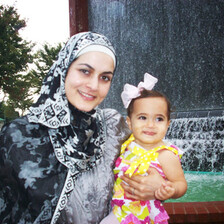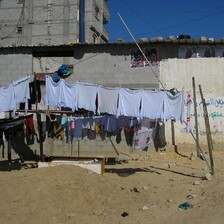Al Jazeera 16 August 2005

Khan Yunis refugee camp on the edge of Khan Yunis close to the Gush Katif settlement bloc. (Arjan El Fassed)
At the edge of the Khan Yunus refugee camp in the southern Gaza Strip, crumbling refugee homes face off with the red-roofed seafront villas of the Neve Dekalim settlement. The settlement, one of 21 chosen for evacuation in coming months, has been the source of much grief - and now speculation - for Palestinians here.
Abo Ahmed’s home stands directly across from Neve Dekalim, the largest and most ideologically extreme of the Gush Katif settlements, a bloc established in 1970 - three years after Gaza was captured and occupied by Israel. Not far from the settlement is an Israeli sniper tower, stationed along with hundreds of soldiers, to protect the illegal settlers from their Palestinian neighbours and original inhabitants of the land. Gunfire from the tower has left pockmarks the size of apples in the wall of Abo Ahmed’s second-floor living room.
Aside from this, the view from the window of the abandoned room is striking. “It’s beautiful, right?” he said, laughing, looking back at his cratered wall. “If only we could enjoy it.” For several years, Abo Ahmed had not ventured up to this room for fear of becoming a target. And though the beach is a five-minute walk away, it is off limits to Palestinians.
Anxious
Like most refugees here, Abo Ahmed is anxiously waiting for the day Jewish settlers leave Gaza and for his life to return to semi-normality. “The settlements are one of the biggest obstacles for us, and we feel it more than anyone here on the front lines. We suffer on a daily basis,” he said.
“All I remember from the past few years is that there were always martyrs, always injuries and always tanks down the street,” he recalled. His sister-in-law, Zakiya Musa, held a nursing three-month-old in her arms. “I just can’t wait for them to leave, so we can relax, for our children’s sake. They are mortified of the sniper fire they hear every night,” she said.
Palestinian Authority
How the settlers will leave and what role the Palestinians will have in all this remains a mystery to most, including the Palestinian Authority (PA). Until now, Israeli Prime Minister Ariel Sharon has largely refused to coordinate his withdrawal from Gaza with the Palestinians, said Palestinian Deputy Prime Minister Nabil Shaath.
“There is very little coordination going on … the Israelis only talk about coordination, but it hasn’t happened,” Shaath told Aljazeera.net. The PA also has to figure out what to do with the land that will return to Palestinian control and how gains will be distributed.
Initially, the Israeli government said it would demolish the settlers’ houses after they were evacuated, then Palestinians would clear the land of the debris. Israeli officials backtracked on the agreement this week. Shaath says a special court will deal with the claims to private land, which constitutes 5% of the total amount of land. The other 95% is government land that cannot be bought or sold for six months after disengagement.
“After this, we will implement a plan of privatising the agricultural areas through a transparent bidding process. In other areas of land, we plan to build housing units for those in most need, such as refugees whose homes have been demolished or families of martyrs,” Shaath said, referring to Palestinians who have been killed by Israeli forces.
Living space
But the idea of building apartment units for the space-starved refugees in Gaza has met with mixed reactions in Khan Yunus. “We would rather build on a piece of land anywhere, or even stay here in the camp, than live in cramped apartment buildings,” said camp resident Abo Walid, whose house has been threatened with demolition by Israeli forces because of its proximity to Neve Dekalim.
“We would leave our house every night for fear they would demolish it on top of us. We couldn’t sleep during the night raids. We were living in daily trauma,” he added. Abo Walid, whose brother was killed by an Israeli sniper two years ago in the camp, says the first thing he will do after the settlers leave is head to the beach.
His friend, Abu Khalid, a teacher in the nearby elementary school, is quick to point out that it is not just about enjoying the beach. “If it was just about having access to a beach, we would go to Gaza City. It’s about our right to live freely. It’s about occupation, which will continue even after they withdraw,” he said.
“Remember, they will still control Gaza’s borders, airspace and sea. And they are relocating all the settlements to the West Bank. They are simply restructuring the occupation.”
For others in Khan Yunus, the question of what should be done after disengagement is simpler. “We want to be able to have fun without the fear of getting shot, to go on outings and play, to go to the seashore,” said 10-year-old Kifah Abu Ibayd. She and some other children trotted off into the horizon, close to the sniper tower, trying to fly a handmade paper kite.
Mawasi enclave
Nearby, Mawasi resident Subhi Astal, 57, waited for Israeli forces to open the Tufah checkpoint. Mawasi, a Palestinian enclave within the Gush Katif bloc, has been sealed off from the rest of the Gaza Strip for more than four years.
Special permits must be obtained to pass the checkpoint, and Palestinian residents often wait for days before they are allowed to enter. “The settlers are leaving in the right time. There is nothing left for them here. They took everything and have completely abused the area’s resources.
“They overdrilled the area for water wells such that the water salinity has increased in Gaza. They are even taking our earth,” said Astal, pointing out several trucks of golden Gaza sand being transported, at 2000 shekels ($437) a load, to Israel for construction purposes.
“I would like to see things improve in Gaza. I think they should turn the settlement lands into a tourist area and some of it into agricultural land. I think the land should be returned to the people, and the returns should be distributed fairly. But I guarantee this won’t happen,” Astal said.
Preparations
Shaath insists the post-disengagement process will be transparent and that the Palestinian Authority has bigger things to worry about after disengagement.
“I don’t think [corruption] is a danger, but rather the chaos that political factions are creating under this pretext. We are worried of a ‘hurry up everyone take a piece of land for yourself before they do because we deserve it’ scenario. Our fear is of something that might resemble Iraq or Algeria post-independence - this is what we want to prevent,” he said.
The PA has established a new security service of 5000 police officers to take control of the evacuated land and to prevent “hostile takeovers”. Though details of post-disengagement are far from ironed out, Palestinians seem to agree on one thing. “Everyone looks forward to withdrawal. We want the occupation to end. We want to live like regular human beings,” said Abo Walid, looking over to the palm-shaded settlement. “Every May, we see their fireworks display from the roof of our house, celebrating their independence day, and our catastrophe. All we feel now is pain and misery. We wish one day to see our independence being celebrated.”
Laila M. El-Haddad is a journalist based in the Gaza Strip. This article was originally published by aljazeera.net and reprinted on EI permission.
Related Links



